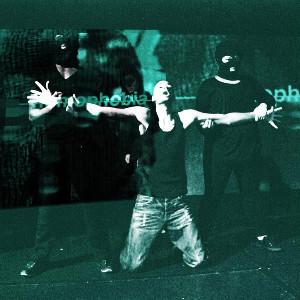By Hannah Phillips
At The Drill Hall Theatre
Poetry by Leeanna Stoddart
Performed by SHOUT’s Young LGBT Performance Company
It’s Halloween weekend and I’m reviewing a play called Fear of Queer; a fusion of drama, poetry, visual arts and media performed by SHOUT’s Young LGBT Performance Company.
I knew little about the piece (barring the website’s tagline and a tip-off from a friend) and I had a lot of questions. Its proximity to Halloween seemed deliberate – was the play an attempt to make me self-consciously aware of the fear of homosexuality still deeply ingrained in my culture?
The website’s advertisement had mentioned role-reversal – was this intended to be taken literally? In other words, was I about to experience a piece which would adopt a heterophobic stance in order to make its audience aware what it was like for the ‘other side’? Even now, I’m conscious that ‘heterophobic’ is not actually even a word – there is no official record of its existence, linguistically at least. To attempt the latter would be a bold move. To achieve it in one hour through a variety of visual and aural media without becoming incoherent would, I thought, be impossible. I was wrong.
As the audience made their way into the auditorium, I was suddenly conscious that I was seated in the second row in a black box theatre, perhaps only a metre or so away from the set (which was minimalist in design, except for a projector screen in the centre of the stage). It was a very intimate set-up.
The play began with a poetry reading by Leeanna Stoddart and these continued throughout the piece, punctuating it and providing a kind of metaphorical commentary on the action which dealt with the relationship of sexuality to the self, role-reversal and the struggle to be an individual in a world full of labels and stereotypes. Her voice was mellifluous and the poetry well-delivered; the timing and meter had been considered and she appeared confident.
The action of the play did essentially operate around role-reversal in that it dealt with the heterosexual relationship of two characters, Tarquin and Aleisha (played by Lee Wallis and Angelica Mukwendi) in a world where homosexuality was the dominant ideology. It does this gracefully and with a sense of humour which belies its serious intentions. The films provided by We_Make_Art were a strong and binding feature of the performance, colouring and complementing the action onstage and raising awareness of the phenomenon of social media and its involvement in creating binarised sexualities.
In the second scene a group of gay-bashing football hooligans are transformed into camp spectators – the versatility of SHOUT’s actors and actresses (who mostly tripled-up on parts) was especially impressive. It was an ensemble piece where every player performed well and, although this review has only mentioned two for simplicity, everyone involved gave a fantastic performance. It was clear that the play had been rehearsed for a long time. The club scene (appropriately located in a venue called ‘DV8’) was where this became most apparent – the poignancy of Tarquin and Aleisha’s relationship was juxtaposed with the jealousy and name-calling of the other characters – with Queenie Man (played by Fabio Balde) in a noteworthy comedy performance.
In a piece like this, which managed to infuse many different styles and techniques, credit must be given to writer and director Hannah Phillips who managed to create a diverse and entertaining piece which blended a variety of styles. SHOUT’s Young LGBT crew are certainly something to look out for.





